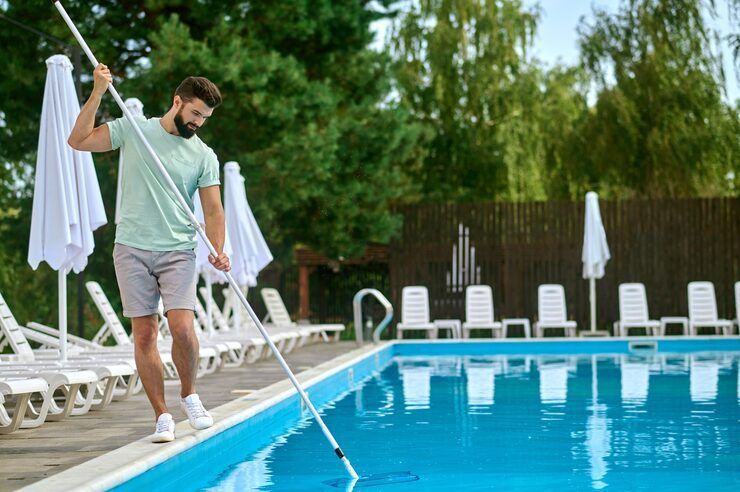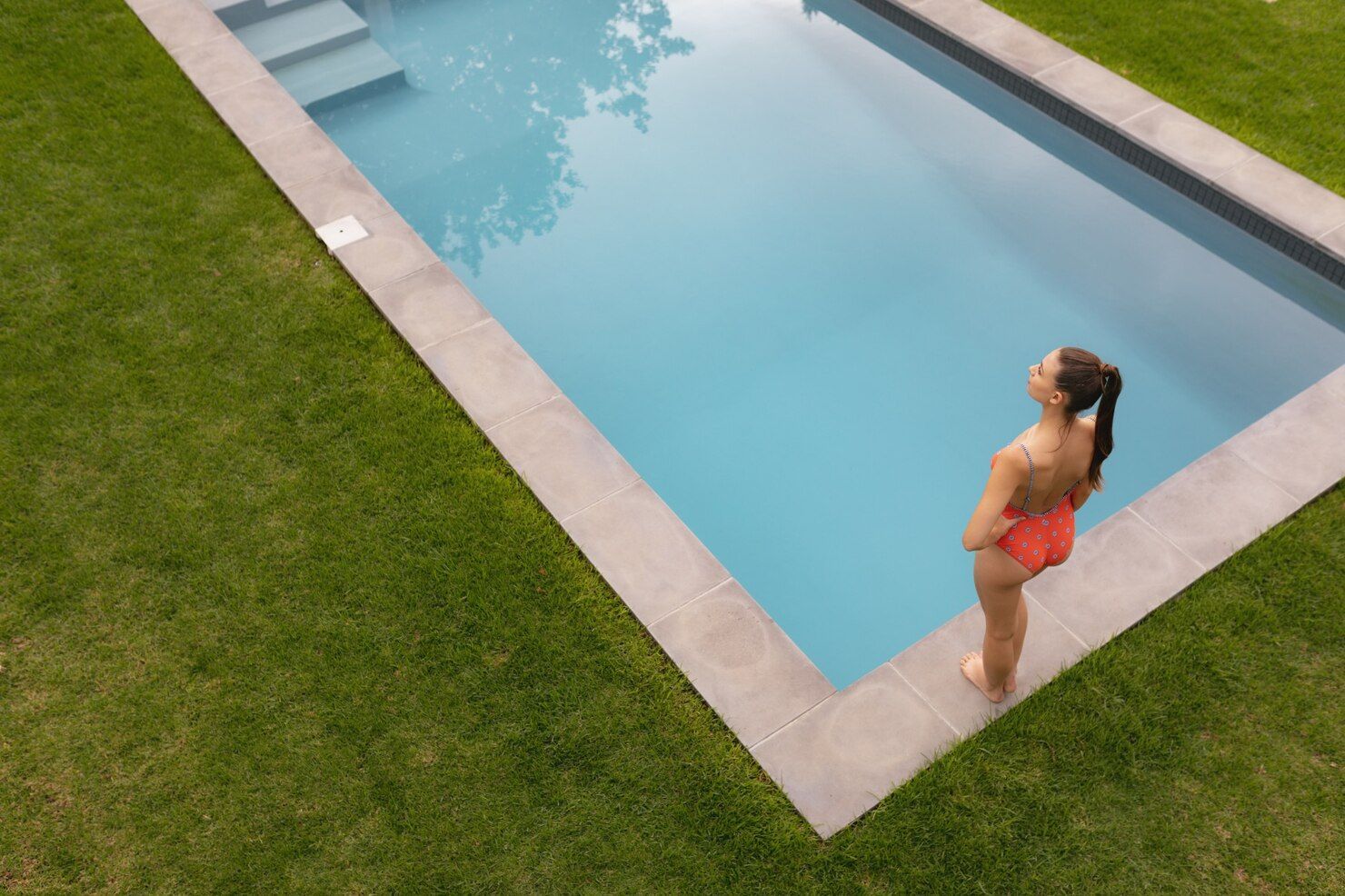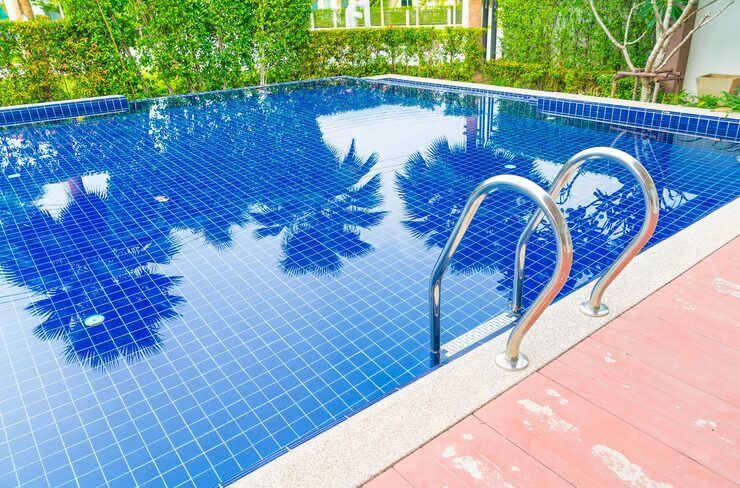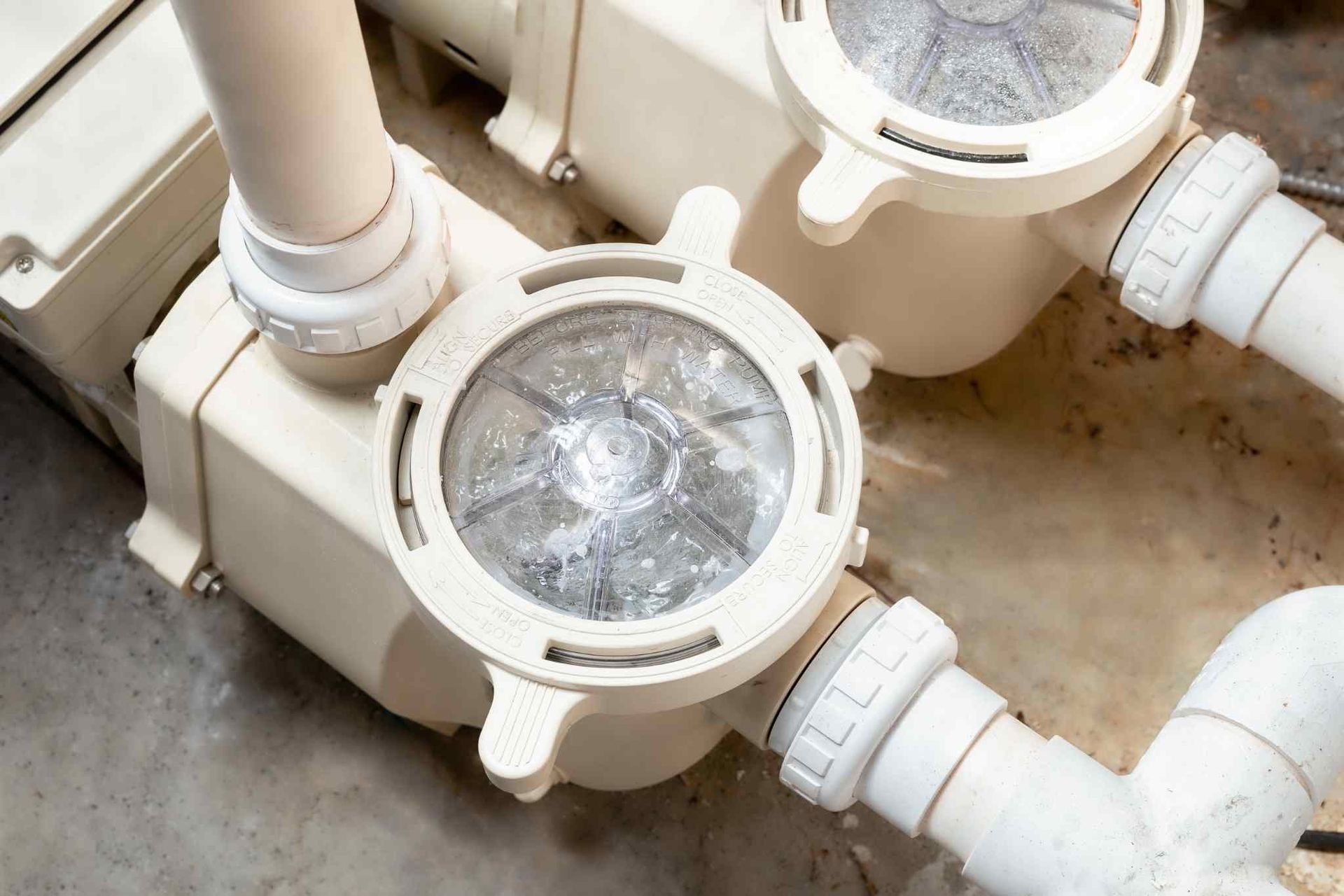Best Way to Keep a Pool Clean Naturally
Key Takeaways
✔ Natural methods like skimming, brushing, circulation, and safe household products keep pool water clear without harsh chemicals.
✔ Daily cleaning habits such as skimming, checking water levels, and running the pump prevent bigger maintenance problems.
✔ Baking soda is best for raising alkalinity and keeping pH steady, while soda ash is used mainly for quickly raising low pH.
✔ Without chlorine or a natural disinfectant, pool water can become unsafe within just a few days, especially in warm weather.
Keeping a pool clean naturally is all about combining simple maintenance with safe, eco-friendly methods. Regular care, such as skimming, brushing, and running the pump, keeps debris and bacteria under control, while natural products like baking soda, vinegar, and hydrogen peroxide help balance and disinfect the water without harsh chemicals. Eco-friendly additions like pool covers, plants, and natural filters also support long-term water care and reduce chemical dependence.
Here are the best ways to keep a pool clean naturally.
How to Keep a Pool Clean Naturally
1. Regular Pool Maintenance
Regular upkeep is the foundation of a clean and safe pool. These simple steps prevent big problems later and are a must in any pool upkeep guide.
Skimming Leaves and Debris Daily
Removing leaves, insects, and floating debris every day keeps the water looking clear and inviting. If left unchecked, this debris sinks, breaks down, and releases nutrients that feed algae growth. Daily skimming is one of the easiest swimming pool tips for keeping water fresh with little effort.
Brushing Pool Walls and Floor Weekly
Brushing once a week removes dirt, algae spores, and film that sticks to pool surfaces. This prevents hidden buildup that could later turn into stains or slippery spots. Regular brushing is an important step in any pool upkeep guide because it helps the pool stay cleaner for longer.
Maintaining Proper Water Circulation
Running the pump for at least 6–8 hours daily helps distribute natural cleaning agents evenly throughout the water. Good circulation also keeps dead zones from forming, where bacteria and algae can multiply quickly. It is a key part of swimming pool maintenance and ensures healthier, clearer pool water.
2. Natural Cleaning Methods
Safe and natural products can replace harsh chemicals and make DIY pool cleaning simple. These swimming pool tips use common household items to keep water fresh.
Using Baking Soda for pH Balance and Scrubbing
Baking soda balances pH levels naturally, preventing water from becoming too acidic. A handful on a brush also works as a gentle scrub to clean steps, tiles, and stains without damaging the surface.
Applying Vinegar for Spot Cleaning and Scale Removal
Vinegar is a great natural cleaner for removing hard water build-up, as its acidity breaks down mineral deposits with ease. It clears away calcium scale and water spots on tiles, ladders, and other surfaces around the pool. By also removing buildup along the waterline, vinegar keeps surfaces clean while remaining safe for swimmers.
Utilizing Hydrogen Peroxide as a Natural Disinfectant
Food-grade hydrogen peroxide acts as a safe disinfectant. It kills harmful bacteria and helps oxidize organic matter. This makes it a good option for those who want to know how to keep a pool clean naturally.
3. Eco-Friendly Additions
Eco-friendly tools and habits reduce chemical use and improve pool water care. They also make maintenance easier over time.
Installing a Pool Cover to Reduce Debris and Algae Growth
Using a cover keeps out leaves, insects, and dirt that would otherwise sink and create extra cleaning work. It also reduces evaporation, helping conserve water and lowering the need for frequent refills. By blocking sunlight, a pool cover slows algae growth, making it one of the simplest tools for easier swimming pool maintenance.
Using Plants Around the Pool to Filter Air and Reduce Contaminants
Plants act as natural air filters by catching dust, pollen, and other particles before they reach the pool. They also provide shade and improve the surrounding air quality, which can keep the water fresher for longer. Adding greenery around the pool boosts the landscape’s beauty while supporting pool upkeep in a natural way.
Considering a Natural Pool Filter System with Sand, Gravel, or Plants
Systems that use sand, gravel, or aquatic plants work like nature’s filter, breaking down waste and keeping water clean. These setups reduce reliance on chemicals and create a balanced pool ecosystem. Choosing a natural filter is an eco-friendly option for long-term pool water care and safer swimming conditions.
4. Algae and Bacteria Control
Controlling algae and bacteria is key to keeping water safe. These natural methods reduce harmful growth without harsh chemicals.
Introducing Barley Straw as a Natural Algae Deterrent
When placed in pool water, barley straw slowly breaks down and releases natural compounds that limit algae growth. It works best as a preventive measure, stopping algae before it becomes a problem. This method is safe, affordable, and effective for natural pool care.
Adding Essential Oils Like Tea Tree or Lavender in Small, Safe Amounts
Essential oils such as tea tree and lavender have natural antibacterial and antifungal properties. Just a few drops can help reduce harmful bacteria while giving the water a fresh scent. It is important to use them sparingly to keep the pool safe for swimmers.
Encouraging Beneficial Bacteria to Keep Harmful Ones in Check
Beneficial bacteria help create balance in the pool’s ecosystem by breaking down organic waste. These good microbes reduce the chances of harmful bacteria multiplying in the water. This natural method supports healthier swimming conditions and is a smart step in DIY pool cleaning.
5. Safe Swimming Practices
Good swimming habits reduce the amount of dirt and germs that enter the water. These small actions support long-term pool water care.
Showering Before Entering the Pool
Showering rinses off sweat, lotion, and body oils that can cloud water and feed bacteria. This simple habit helps the pool stay fresher longer.
Keeping Pets and Excess Dirt Out
Pets and shoes carry dirt, hair, and bacteria. Keeping them out of the pool prevents extra cleaning work and helps protect the water’s balance.
Encouraging Consistent Water Testing
Testing with simple strips or kits ensures the pH and disinfectant levels stay balanced. This step is one of the most important swimming pool tips for safe and clean water.
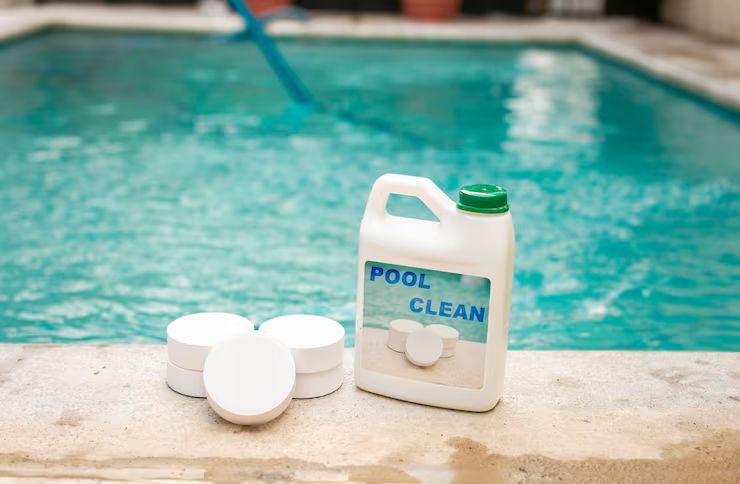
What’s the Best Way to Keep a Pool Clean Every Day?
Keeping a pool clean daily is all about small, consistent steps. Skimming leaves and insects, checking water levels, and making sure the pump is running for a few hours helps keep the pool fresh. These simple habits prevent bigger problems and make swimming pool maintenance much easier over time.
Should I Use Baking Soda or Soda Ash in My Pool?
Both baking soda and soda ash can be useful, but they do different things.
- Baking Soda: Baking soda raises the alkalinity of pool water, which helps prevent sudden pH swings. A steady alkalinity level makes the water more comfortable for swimmers and protects pool equipment from corrosion. It is a common choice in DIY pool cleaning because it is safe, affordable, and easy to use.
- Soda Ash: Soda ash increases the pool’s pH quickly, which is useful if the water is too acidic. It does not raise alkalinity much, so it is best when only pH needs to be corrected. Using soda ash is part of good pool water care because it helps maintain balance without over-adjusting alkalinity.
How Long Does Water in a Pool Remain Usable Without Chlorine?
Pool water without chlorine will not stay safe for long. In warm weather, bacteria and algae can start growing in just a few days. Even with regular skimming, the water may become unsafe to swim in within a week. Chlorine or natural disinfectants are important for proper pool water care.
Frequently Asked Questions (FAQs)
How often should a pool filter be cleaned?
A pool filter should be cleaned every few weeks during regular use, but it may need more frequent cleaning if the pool collects a lot of debris. Dirty filters reduce water flow and allow dirt to stay in the water. Cleaning the filter keeps circulation strong and helps prevent cloudy water. A clean filter is essential for swimming pool maintenance and overall pool water care.
Can rainwater affect pool water quality?
Rainwater can lower the pool’s pH and dilute the chemicals, which can throw off the water balance. It may also wash in dirt, pollen, and other debris that make the pool harder to clean. After heavy rain, testing and adjusting the water chemistry is important. Skimming and checking the filter also help restore clean water.
Is it safe to swim if the pool looks clear but hasn’t been treated?
Even if water looks clean, it can still contain bacteria and algae that are unsafe. Without proper treatment, harmful organisms grow quickly, especially in warm weather. Swimming in untreated water can cause skin irritation or illness. Proper pool upkeep is always needed to make sure water is safe for swimmers.
What natural options help reduce chlorine smell?
Strong chlorine smell often comes from chloramines, which form when chlorine mixes with sweat and dirt. Adding natural oxidizers like hydrogen peroxide can help break these down. Regular brushing, skimming, and showering before swimming also reduces the smell. These steps improve pool water care without needing more chemicals.
How can pool evaporation be reduced naturally?
Evaporation is a common issue, especially in hot climates. Using a pool cover prevents water loss and keeps debris out at the same time. Placing windbreaks such as hedges or fences around the pool area also slows evaporation. These eco-friendly steps help save water and cut down on upkeep.
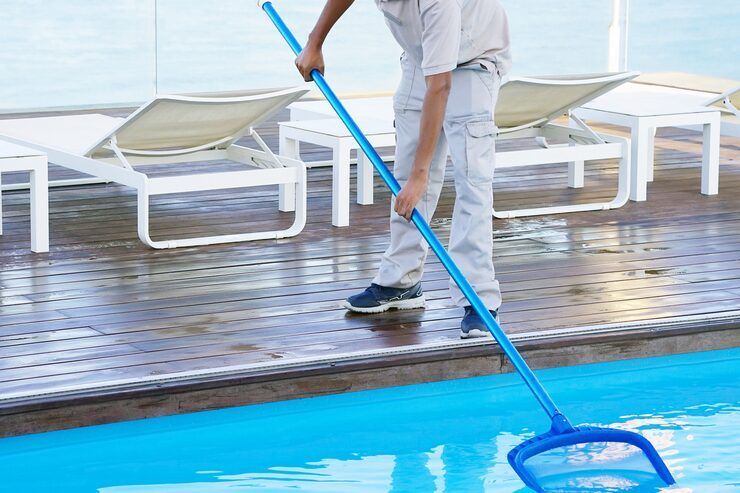
Get Reliable Pool Services in Danbury, CT!
FJV Construction delivers professional pool care that keeps every system running at its best. Services include expert pool filtration service, seasonal pool closing, thorough pool cleaning, precision pool vacuuming, and dependable pool repair in Danbury, CT. Every detail is handled with care to protect equipment, extend pool life, and maintain clear water throughout the season. Pools across Danbury, CT, benefit from trusted service backed by experience and quality workmanship.
Call FJV Construction today to schedule professional pool services in Danbury, CT!


